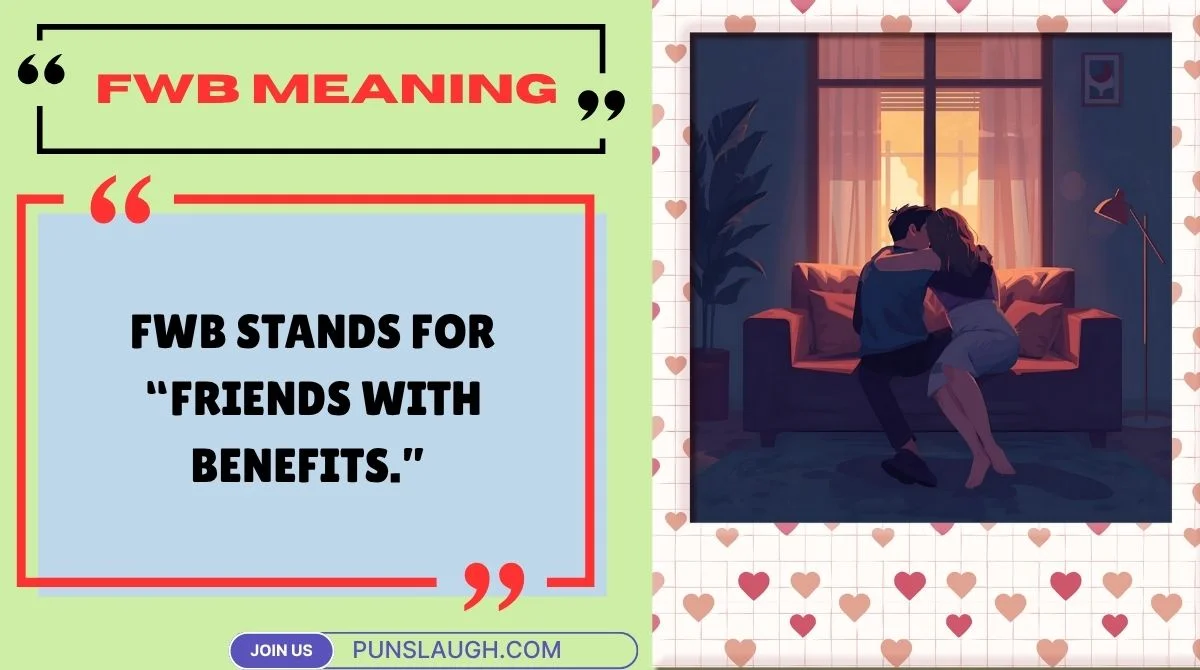Understanding FWB meaning is more than just knowing what the acronym stands for.
In today’s world of dating apps, fast-paced lifestyles, and shifting relationship norms, Friends With Benefits (FWB) has become a common term. Yet, many still misunderstand what it truly involves.
This guide explores FWB from every angle—its definition, how it differs from dating, what it looks like in real life, the pros and cons, communication essentials, mental health factors, and even platform-specific nuances.
“Clear communication and mutual respect turn an FWB arrangement from risky to rewarding.” — Dr. Amy Reynolds, Relationship Counselor
What Does FWB Really Mean?
FWB stands for “Friends With Benefits.” It describes a relationship where two people maintain a friendship while engaging in a physical or intimate connection—without the commitment or expectations of traditional dating.
- Origin: The phrase gained popularity in the late 1990s and early 2000s, driven by pop culture and dating discussions online.
- Core Idea: You keep the friendship intact but add consensual intimacy.
- Misconception: Many assume FWB equals casual hookups. In reality, it’s more about maintaining a bond that includes physical intimacy but without romantic exclusivity.
FWB often appeals to people who want closeness and companionship but aren’t ready—or don’t want—a committed relationship.
FWB in Different Contexts
FWB Meaning in Text and Chat
In texting or DMs, “FWB” is often shorthand. Examples:
- “Looking for an FWB, no drama.”
- “We’ve been FWB for a while now.”
In messages, it usually signals casual interest and sets the tone early.
FWB in Slang and Pop Culture
Pop culture helped popularize the term. Movies like “No Strings Attached” (2011) and “Friends with Benefits” (2011) brought it into mainstream vocabulary.
Memes and viral tweets often depict it humorously—highlighting the awkward or playful dynamics.
FWB in Dating and Relationships
In dating contexts, FWB sits between:
- Casual hookups: Usually spontaneous and short-term.
- Dating: More emotionally involved, often seeking a future together.
An FWB relationship typically combines ongoing friendship with intimacy but excludes emotional exclusivity.
FWB in Medical or Support Contexts
Though less common, some support or therapy circles use “FWB” differently—to describe “Friends With Boundaries” or friendship-based care support. However, in most social situations, FWB retains its mainstream meaning: Friends With Benefits.
Key Differences: FWB vs Dating vs Casual Hookups
Here’s a simple comparison to clarify the distinctions:
| Aspect | FWB | Dating | Casual Hookups |
|---|---|---|---|
| Emotional Expectations | Low to moderate | Moderate to high | Low |
| Commitment | Typically none | Often present | None |
| Frequency of Contact | Flexible | Regular and intentional | Sporadic |
| Communication Needs | High for boundaries | Moderate to high | Low |
| Future Goals | Usually none | Often long-term | None |
Tip: If one partner expects exclusivity or long-term commitment, it’s no longer an FWB arrangement.
How FWB Works in Real Life
An FWB relationship often moves through these stages:
- Friendship: A baseline of trust and shared interests.
- Proposal: A conversation about exploring intimacy without commitment.
- Agreement: Setting clear boundaries and expectations.
- Ongoing Interaction: Balancing friendship with physical connection.
- Re-evaluation: Checking in as feelings or life circumstances change.
Common challenges:
- Misaligned expectations
- Emotional attachment
- Social stigma or judgment
- Navigating friendships after ending intimacy
Pros and Cons of FWB
✅ Pros
- Flexibility: No traditional relationship obligations.
- Comfort: Intimacy with a trusted friend instead of a stranger.
- Freedom: Space for personal goals without commitment pressure.
- Better Communication Skills: Requires honesty about needs and limits.
❌ Cons
- Emotional Risks: Feelings may grow beyond the initial agreement.
- Jealousy Issues: Potential discomfort if one partner dates others.
- Boundary Blurring: Friendship can become strained if intimacy ends.
- Mental Health Impact: Some individuals may feel undervalued or stressed.
Case Study:
A 2022 survey of 1,200 adults (ages 20–35) found that 38% had tried FWB. Among them, 42% reported emotional attachment developing over time, which often complicated the arrangement.
Communication and Boundaries in FWB
Strong communication is the backbone of any healthy FWB arrangement.
Conversations to have before starting:
- Will it be exclusive or open?
- How often will you meet or communicate?
- How to handle emotions if they change.
- What happens if one wants to stop or start dating someone else.
“Boundaries protect the friendship and keep the arrangement sustainable.” — Dr. Karen Phillips, Psychotherapist
Regular check-ins can help both parties stay on the same page and reduce misunderstandings.
Sexual Health and Safety in FWB
FWB relationships, like any sexual relationship, require attention to health and safety:
- Use Protection: Consistently use condoms or other safe-sex measures.
- Regular Testing: Both partners should get tested for STIs.
- Consent and Respect: Every encounter must be enthusiastic and consensual.
- Privacy Concerns: Avoid sharing personal details or photos without consent.
According to the CDC (2023), routine STI testing and transparent communication significantly reduce risks in casual or semi-casual relationships.
FWB Across Platforms
Snapchat
On Snapchat, FWB dynamics often start subtly:
- Streaks used as a form of consistent contact.
- Inside jokes or late-night snaps as signals.
- Emojis (like the 😏 or 🔥) sometimes hint at flirty intentions.
Grindr and LGBTQ+ Apps
In LGBTQ+ spaces, FWB may focus more on trust and discretion. Apps like Grindr often feature profiles seeking “NSA or FWB,” emphasizing casual intimacy without romantic pressure.
Other Platforms
- Tinder/Bumble: Many bios specify “FWB preferred” or “open to FWB.”
- Reddit: Subreddits such as r/dating_advice often discuss FWB tips and experiences.
Related Terms and Their Differences
| Term | Meaning |
|---|---|
| NSA (No Strings Attached) | Casual intimacy with minimal emotional connection. |
| Casual Dating | Dating without exclusivity but with romantic undertones. |
| Booty Call | Primarily physical and often spontaneous. |
| Open Relationship | Committed couple allows outside partners. |
| Polyamory | Multiple consensual romantic and/or intimate relationships. |
Deciding If FWB Is Right for You
Quick Self-Assessment Checklist
Ask yourself:
- Am I comfortable with non-exclusive intimacy?
- Can I separate physical connection from emotional attachment?
- Will I communicate openly about boundaries and feelings?
- How would I feel if my FWB starts dating someone else?
Real-Life Insights & Statistics
- According to a 2021 Kinsey Institute report, over 45% of singles aged 18-29 have had an FWB relationship.
- About 30% of FWBs eventually transition into committed dating relationships.
- People with secure attachment styles tend to navigate FWB better than those with anxious attachment.
Mental Health in FWB Arrangements
Some people thrive in FWB setups, others struggle.
Key points:
- Emotional clarity and honesty reduce stress.
- Watch for signs of unreciprocated feelings.
- Don’t hesitate to seek therapy if the relationship affects self-esteem or mood.
- Mental well-being matters as much as physical health.
Alternatives to FWB
If FWB doesn’t feel right, consider:
- Casual dating with open expectations.
- Building friendships first before exploring romance.
- Relationship anarchy (rejecting traditional labels).
- Long-distance companionship with set boundaries.
FAQs About FWB Meaning
What does FWB mean in a relationship?
It means two friends share intimacy without traditional dating commitments.
Can FWB relationships become serious?
Yes. Studies suggest about 1 in 3 FWB setups evolve into committed relationships.
Is FWB common among young adults?
Very. Data shows it’s most prevalent among those aged 18–30 due to lifestyle flexibility.
How long do FWB relationships last?
On average, they last 4–6 months before either evolving into something more or ending.
How should you end an FWB arrangement?
Be honest, clear, and respectful—ideally in person or via a thoughtful conversation.
Conclusion: The Takeaway on FWB
FWB relationships can be fulfilling when honesty, respect, and communication remain at the core.
They’re not for everyone, but with the right mindset and boundaries, they can offer companionship and intimacy without the demands of traditional dating.
The key to success in any FWB arrangement lies in clarity, self-awareness, and ongoing dialogue.





